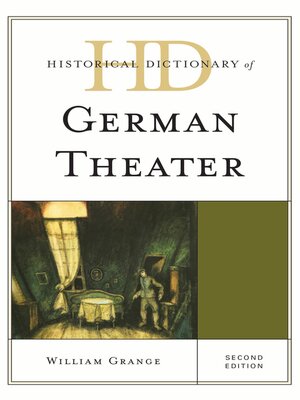Historical Dictionary of German Theater
ebook ∣ Historical Dictionaries of Literature and the Arts
By William Grange

Sign up to save your library
With an OverDrive account, you can save your favorite libraries for at-a-glance information about availability. Find out more about OverDrive accounts.
Find this title in Libby, the library reading app by OverDrive.



Search for a digital library with this title
Title found at these libraries:
| Library Name | Distance |
|---|---|
| Loading... |
The German-language theater is one of the most vibrant and generously endowed of any in the world. It boasts long and honored traditions that include world-renowned plays, playwrights, actors, directors, and designers, and several German theater artists have had an enormous impact on theater practice around the globe. Students continue to study German plays in dozens of languages, and every year scores of German plays are produced in a wide variety of non-German venues.
This second edition of Historical Dictionary of German Theater covers its history through a chronology, an introductory essay, appendixes, and an extensive bibliography. The dictionary section has over 400 cross-referenced entries on directors, designers, producers, and movements such as Regietheater, "post-dramatic" approaches to theater production, the freie Szene of independent, non-subsidized groups, the role of increasingly massive government subsidies, and cities whose reputations as centers of innovation and excellence that have made the German-language theater one of the most vibrant anywhere on earth. This book is an excellent access point for students, researchers, and anyone wanting to know more about German Theater.
This second edition of Historical Dictionary of German Theater covers its history through a chronology, an introductory essay, appendixes, and an extensive bibliography. The dictionary section has over 400 cross-referenced entries on directors, designers, producers, and movements such as Regietheater, "post-dramatic" approaches to theater production, the freie Szene of independent, non-subsidized groups, the role of increasingly massive government subsidies, and cities whose reputations as centers of innovation and excellence that have made the German-language theater one of the most vibrant anywhere on earth. This book is an excellent access point for students, researchers, and anyone wanting to know more about German Theater.







